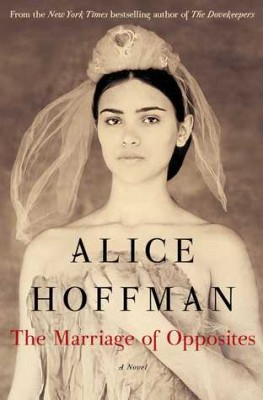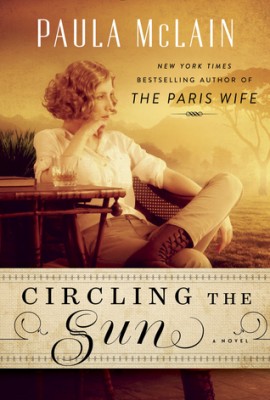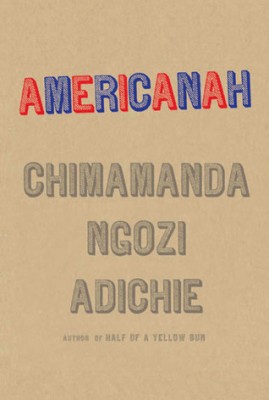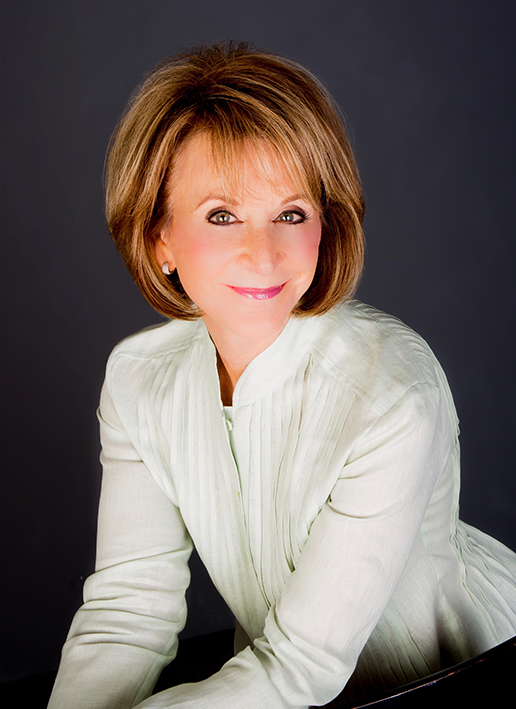BD read these books, too!
Last week was for audio, but here are three books I recently read in the flesh, as so many of you choose to do as well. Audio or print, the stories remain the same. If something in one of these books appeals to you and you’re an audiobook person, by all means, listen.
First, The Marriage of Opposites, by Alice Hoffman.

I have loved Alice Hoffman’s books for years, and “The Marriage of Opposites” didn’t entirely disappoint. Her portrayal of setting is exquisite – in this case, St. Thomas in the first half of the 1800’s, then Paris. Her imagery is vivid, and her research through. I have no doubt but that the historical detail offered in “The Marriage of Opposites” is accurate.
Truly, though, I learned more about the scenery that may have inspired the artist, Camille Pizzarro, than about the artist himself – or any of the other characters, for that matter. The story seemed to float along on a beautiful surface without ever quite dipping beneath. I felt that the author told me her story, rather than letting me live it myself. The characters felt flat and two-dimensional. I never truly got inside them.
And then, when the artist’s mother, Rachel, whose voice is the most prominent in the book, grew unreasonably bitter, the charm I usually feel while reading Hoffman’s books was lost. Even the magical elements in this book felt superimposed.
That said, I deeply admire Alice Hoffman as a writer. This book may not have resonated with me, but so many of her other books have that I will buy her again without doubt.
Second, Circling the Sun, by Paula McLain.

After so much praise for her last novel, “The Paris Wife,” it must have been daunting for this author to approach a follow-up. The woman she chose to chronicle this time around, Beryl Markham, was the first woman ever to fly solo from England to North America, though this is a surprisingly small part of the book. The bulk of it details her childhood in what would become Kenya, her growing up years as a fiercely independent woman in a male-dominated world, and her endless bid for freedom.
“Circling the Sun” is one of the most lyrically descriptive books I’ve read lately, which is one of the reasons I was desperate to adore it. But I didn’t. Much as I loved the style, I was increasingly frustrated with the pacing, organization, and the search for a point to the book.
The main character was prone to making poor decisions, impulsive decisions. She was scattered in matters of the heart – loving one thing, then another and another, perhaps all in compensation for her mother’s desertion when she was four. By the time she got to flying, I felt she was simply running away. Yes, through the book she seeks freedom, which flying embodies. But with so little here about her actually experience in a plane, flying seemed like just another distraction.
Paula McLain certainly couldn’t change Beryl Markham’s life. But I wish she had been more focused in her retelling of it. And then there’s the title. Does it mean that Beryl is always in orbit, as in, on the move? Or that she is destined to always revolve around bigger and brighter things? Or does it relate to flight (though her solo flight was portrayed as being wholly in the dark)? This was unclear. At the end, like Beryl, I felt unfulfilled. Perhaps this is what the author intended.
Finally, Americanah, by Chimamanda Ngozi Adichie

I struggled with this book. When it first came out, I picked it up more than once after hearing buzz about it, but something held me off. Then my book group picked it for discussion, and I had no excuse. My initial hesitance lingered, then grew through the reading, and though we had an amazing book group discussion, nothing was said that changed my mind.
Strong points? Characterization. There were wonderfully rich side characters. And places. Scenes in the hair braiding shop in New Jersey were clear and poignant. This book makes hair into a symbol, and I do see that, though whether it’s a race thing, a class thing, or simply a style thing, I’m not sure. Hair care is a huge commercial enterprise, not just in New Jersey or in Nigeria, but worldwide, and seeing it through Adichie’s eyes was enlightening.
There were some other wonderfully insightful moments here, any one of which might have formed the core of this book, had they not been so quickly passed by.
That, for me, was the problem This book was all over the place — not quite a memoir, not quite a novel, not quite a blog. By the author’s own admission, the story was semi-autobiographical. And the main character does have an awful time as she goes from Nigeria to America and back. But nothing about her engaged me. Nothing about her evoked compassion. She was her own worst enemy, making one bad decision after another, sabotaging her own happiness and hurting others. Yes, she encountered racism. But she too often blames it for things that may, indeed, be simple facts of life.
The author gave a TED talk about the danger of hearing only one story. In this book, she tells only one story. I’m sorry for that. She is articulate and has talent as a writer. I simply wish it were better directed.
There you have it, three more books to consider. Interesting, that the three I reviewed two weeks ago, all of which I heard in audiobook, worked better for me. Is that because the narrator added something that was lacking in print? This is something to discuss.

If you’d like to read more of Barbara’s book reviews, sign up for her newsletter here. You can also find her on Instagram where she frequently shares photos of her photography, family, and travels.
Want an insider peek to all things writing? Join her street team!